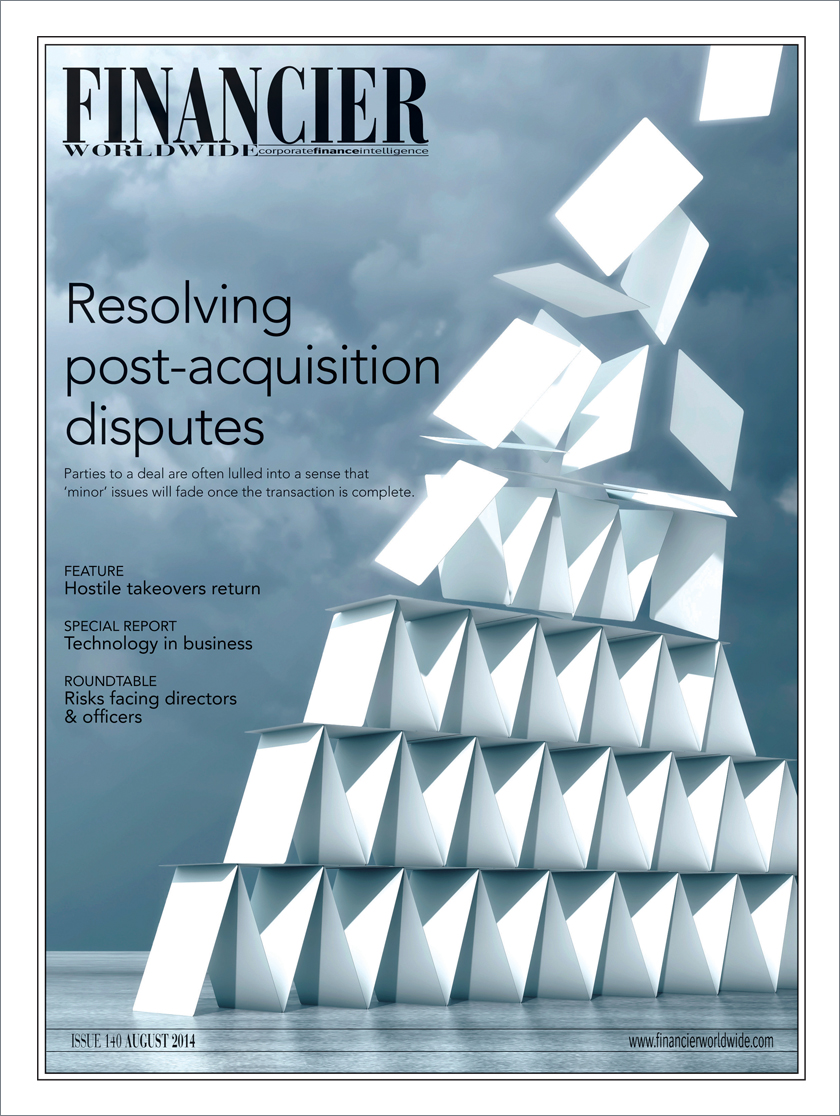Shire rejects $46bn takeover
August 2014 | DEALFRONT | MERGERS & ACQUISITIONS
Financier Worldwide Magazine
British pharmaceuticals firm Shire plc announced on 20 June it had rejected a $46bn takeover offer from rival pharma group Abbvie.
In a statement announcing the deal, Shire noted that the offer from US firm Abbvie “fundamentally undervalued” the company. Susan Kilsby, Shire’s chairman, also stated that “With an expanded portfolio focused on high-growth opportunities, an efficient cost base and an enhanced innovative pipeline, we have put in place a platform for long-term value creation. We believe that Shire has a strong independent future. The board believes the proposal fundamentally undervalued Shire and its prospects and that as an independent company Shire’s focused growth strategy will continue to deliver significant shareholder value and patient benefits.”
Abbvie had offered Shire’s stakeholders £46.26 in cash and Abbvie stock for each outstanding Shire share, a price which represented a 30 percent premium on the company’s share price over the preceding month. Despite this premium, Shire’s board of directors unanimously rejected the offer and advised the firm’s shareholders to take no action relating to the proposed takeover.
Although at the time of writing it is unclear whether Abbvie will return with an improved offer, a number of analysts expect the US firm to bid again. It is believed a figure above £50 per share would be enough to secure a deal for Shire. However, should Abbvie return with an improved offer, the UK firm has already announced it intends to rebuff its advances. Shire’s board has pledged to turn its business into a world-leading biotech firm over the next seven years. Shire’s senior management plans to cement the company’s standing in the biotech and pharmaceutical industries by doubling sales to around $10bn. The company’s chief executive Flemming Ørnskov, who assumed control of the company in May 2013, is aiming for current product line sales of at least $7bn by 2020 with a further $3bn earmarked for drugs still in the company’s extensive pipeline. Although Mr Ørnskov’s projected figures have been met with some scepticism in the pharmaceutical industry, Shire clearly has a plan in place to reject the overtures of Abbvie.
Should the American firm ultimately prove successful in its takeover of Shire, the acquisition would be the next chapter in the long running story of pharmaceutical industry consolidation. Indeed, the offer for Shire came just a matter of weeks after the failed $117bn Pfizer-AstraZeneca deal. Should Abbvie return with a further bid for its British target, it may find it has competition. Some analysts have suggested Pfizer itself as an alternative suitor for Shire.
Although both the rejected Shire and AstraZeneca deals have their roots in expanding product lines and pipelines, they are both also tax-related plays. Although Shire is a UK firm, it is headquartered in Dublin, Ireland. Ireland’s corporation tax rate is currently 2.5 percent, one of the lowest in the world. Tax concerns have been one of the driving forces behind M&A activity of late, particularly in the pharma sector. On 16 June, Medtronic Inc agreed to acquire drug manufacturer Covidien Plc, a maker of rare disease medicines, for around $42.9bn. For some time now, American pharmaceutical firms have been attempting to acquire rival companies across Europe and the UK. With many EU states benefiting from relatively low tax rates, by acquiring businesses from across Europe, US firms are able to change their tax domicile, moving their overseas earnings and cash out of the reach of the US Internal Revenue Service. By acquiring European assets, US firms can decrease their tax burden appreciably.
© Financier Worldwide
BY
Richard Summerfield

